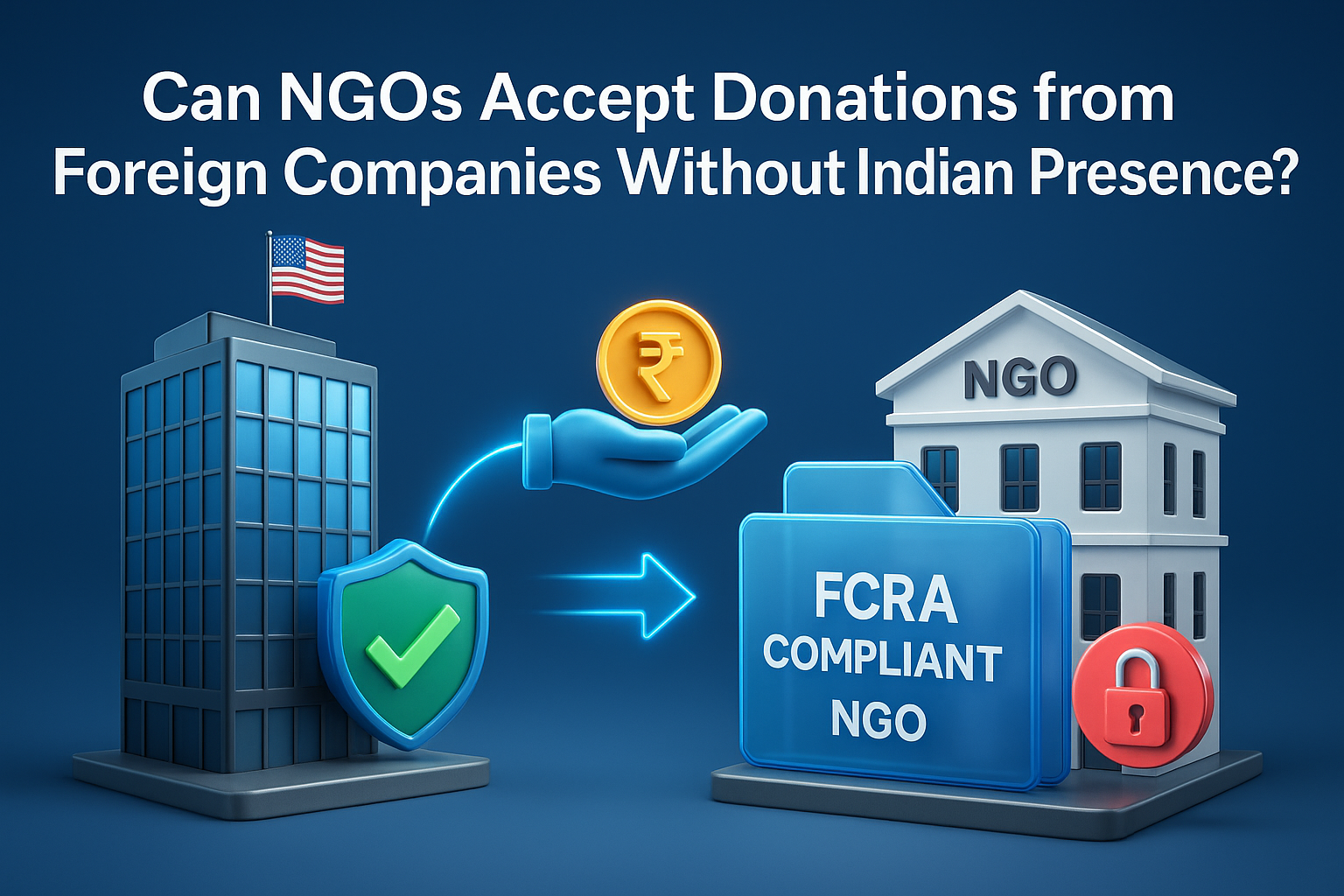
Can NGOs Accept Donations from Foreign Companies Without Indian Presence?
Overview
The acceptance of donations from foreign companies without an Indian presence is a complex issue governed by the FCRA, 2010, which classifies such contributions as foreign contributions requiring strict compliance. These companies, lacking a physical or legal presence in India, are considered foreign sources under FCRA, necessitating registration or prior permission for NGOs to accept their donations. The funds must be received in the Designated SBI account, and non-compliance can lead to severe penalties, including fines, fund seizure, and cancellation of registration. The interplay with the Income Tax Act, 1961, further complicates matters, as unauthorized donations may be taxable if exemptions are denied. NGOs must exercise diligence to ensure compliance and maintain their charitable status.
Statutory Framework
Section 2(1)(h) of the FCRA, 2010, defines a foreign contribution as any donation, delivery, or transfer made by a foreign source, including companies not incorporated in India or without an Indian subsidiary. Section 11 mandates that NGOs obtain FCRA registration or prior permission to accept such contributions, with violations punishable under Sections 3335, including fines and imprisonment up to five years. The 2020 FCRA amendments tightened oversight, requiring all foreign contributions to be deposited in the SBI Designated Account. Under the Income Tax Act, 1961, such donations are exempt under Section 11 if applied to charitable purposes and FCRA-compliant, but non-compliance may render them taxable under Section 2(24).
Legal and Tax Implications
NGOs with FCRA registration can accept donations from foreign companies without an Indian presence, provided the funds are deposited in the Designated SBI account and used for approved charitable purposes. Prior permission is required for specific contributions if the NGO is not registered or for one-time projects.
Non-compliance, such as accepting funds without registration or in a non-designated account, triggers penalties, including seizure of funds and potential tax liabilities under the Income Tax Act. The MHAs stringent oversight ensures that such donations are scrutinized for transparency and alignment with national interests, making compliance critical.
Judicial and Regulatory Insights
The MHAs cancellation of over 20,000 FCRA registrations since 2011, including cases like Oxfam India for alleged misuse of foreign funds, underscores the governments vigilance. The 2022 Supreme Court ruling upholding FCRA amendments emphasized the need for transparency in foreign funding, particularly from entities without an Indian presence. Regulatory actions, such as the 2018 notice to 156 NGOs for failing to open PFMS-integrated accounts, highlight the importance of proper banking protocols for foreign contributions.
Practical Scenarios
An FCRA-registered NGO receives a Rs. 15 lakh donation from a U.S.-based company without an Indian presence, deposited in the SBI Designated Account, and uses it for a healthcare project, ensuring compliance and tax exemption. In contrast, an unregistered NGO accepts a Rs. 5 lakh donation from a UK company,
leading to fund seizure and taxation as income due to FCRA violation. Another scenario involves an NGO with prior permission accepting a one-time Rs. 3 lakh donation from a foreign company, complying with FCRA and maintaining exemption. A fourth case sees an NGO failing to verify the donors status, resulting in penalties when the donation is deemed a foreign contribution.
Common Pitfalls and Mitigation Strategies
A common error is assuming donations from foreign companies are exempt from FCRA requirements, leading to unauthorized acceptance and penalties. NGOs can mitigate this by verifying the donors status and ensuring
FCRA registration. Depositing foreign contributions in a non-designated account is an other pitfall, risking seizure and fines. Using the SBI Designated Account exclusively prevents this. Inadequate documentation, such as failing to record donor details, invites scrutiny; NGOs should maintain comprehensive records of all transactions. Lastly, neglecting to report donations exceeding Rs. 1,00,000 via Form FC-1 within 30 days can lead to penalties, which can be avoided through timely reporting.
Professional Recommendations
NGOs should verify the legal status of foreign companies to confirm they are foreign sources under FCRA. Obtaining FCRA registration or prior permission is essential before accepting such donations. All contributions must be de posited in the SBI Designated Account, with clear instructions to banks to avoid errors. Maintaining detailed records of donor identity, contribution amounts, and utilization is critical for audits. Engaging legal and tax experts to ensure compliance with FCRA and Income Tax regulations, and conducting regular audits, strengthens financial governance. Staying updated on MHA guidelines ensures NGOs remain compliant with evolving requirements.
Conclusion
NGOs can accept donations from foreign companies without an Indian presence if they have FCRA registration or prior permission, with funds deposited in the Designated SBI account. Non-compliance risks severe penalties and tax liabilities, making adherence to FCRA protocols essential. By verifying donor status, maintaining trans parency, and seeking professional guidance, NGOs can navigate these complexities and sustain their charitable operations.
Understanding Charitable Trusts in India In India, the most commonly understood form of constitut...
Private trusts and family trusts are like magical shields that protect your money and property. Th...
FCRA Annual Return Errors Leading to Penalties or Suspension NGOs registered under FCRA...
New Income Tax Return Filing Requirements for NGOs – Form ITR-7 Explained Legal Framewo...
How to File ITR-7: A Step-by-Step Guide Who Must File. ITR-7 is the Income-tax return f...
Whether GST Should Apply to Donations Linked to Services– Controversy Around NGO Train...
Is GST Registration Required for Section 8 Companies? With the introduction of the Goods and Ser...
What Happens When Trustees Resign or Die–Legal and Practical Issues The resignati...
Private trusts serve as powerful tools for asset management and wealth preservation, but understan...
Form 10BD and 80G Compliance Legal Framework Section 80G(5)(viii) of the Income Tax A...